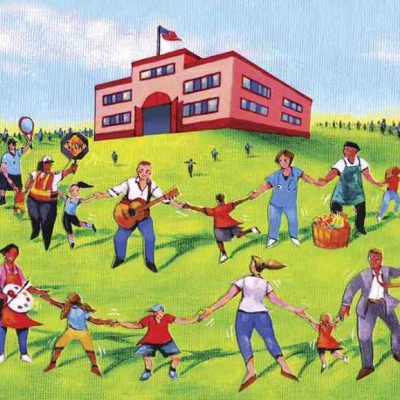When it comes to the future, only you know what you need
As kids in Boston, our lives feel like they’re constantly filled with academic competition. We’re given onesies as babies that say “wicked smaht” in Harvard crimson and spend the rest of our childhoods trying to earn this title. From second graders trying to test into advanced work, to middle schoolers joining summer programs dedicated to getting into an exam school, to sophomores looking for after-school experiences associated with MIT and BU, it feels like the most valuable thing we can do is be academically successful. This all comes to a head when we’re looking at and applying for colleges. I can barely get through a school day without hearing one peer talk about how much they want to get into an Ivy League or a teacher reminding me that getting one math problem right will make or break when I’m trying to get a master’s degree in eight years.
Of course, this is not a new problem. Students have been stressed by schoolwork and competing through college applications for years. But our generation especially has seen extreme competition over our academic success. Lee Shulman Bierer of College Applications Strategies chalks this competition up to increased numbers of applicants, noting that almost two-thirds of all high school graduates are now applying to college, compared to just one-half of grads applying thirty years ago. Additionally, academic success is becoming more of a need and less of a desire. The number of jobs requiring a bachelor’s degree is expected to rise by 10% from 2016 to 2026. The workforce is becoming more competitive and students are becoming competitive with it. But this competition, no matter how much it makes sense in today’s professional climate, is causing teens to stress.
Some teens have described the idea of preparing for college as “daunting,” while others have said that they feel like they’re under a ton of pressure to be perfect during the whole process. Even those who are excited about college find the idea of preparing incredibly stressful and almost not worth it. As Presley, a junior at Prospect Hill Academy, said “College is like a dream, but the application feels like a nightmare.” Others have echoed this sentiment, acknowledging that they think they will have fun in college but are currently too bogged down with pressure in getting into the best college and being the best students to appreciate this hopeful future. This expectation is too much for any student to handle and shouldn’t be distracting from the excitement of our futures. So what can we do to bring back this excitement?
Joan Casey, a college counselor at Educational Advocates, has some advice. She encourages students to dig deep into their interests and explore the colleges and pre-college activities that meet their wants and needs. “Students should look at high school as a time to explore,” she said, emphasizing that students should figure out what they like doing and what interests them, even if that changes all the time. There are so many things out there, even things that kids don’t know about yet, and there doesn’t need to be a pressure to commit to doing anything, nonetheless being the best at it.
Casey also says that kids need to let go of the prestige and competition of certain colleges. Just because a college is huge and well-known by everyone doesn’t mean it’s the right school for you. Schools that some might look down upon: state schools, “safeties,” quirky liberal arts colleges, all have just as much to offer as Harvard or Northeastern. It all depends on what you need. “Think about what kind of people you want to be around,” Casey says, later noting that thinking about the academic culture you succeed in can be crucial for decision-making. Some students don’t do well with tests, some don’t want projects, some students want bigger classes, and some want smaller ones. These, and so many other factors, vary from school to school and almost everyone can find a school that matches their best learning environment. All colleges have different opportunities for different people and this is what students should focus on, not the brand or reputation of certain schools.
The bottom line is that high school and preparing for college is stressful. But it doesn’t have to be as bad as we often feel like it is. Just remember that everyone is unique and there are so many colleges, work opportunities, and things to do in high school that will allow our unique selves to flourish. As Casey said, “There’s all different kinds of pathways that are right for all different kinds of students. It’s all going to be okay.”










